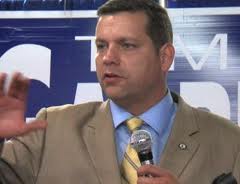Fireworks ban continues, as big biz lobbying influences VA House

FIREWORKS: Va. Sen. Tom Garrett says the lobbying influence from the fireworks industry killed a fireworks bill of his that had the support of the safety community.
By Kathryn Watson | Watchdog.org, Virginia Bureau
ALEXANDRIA, Va.— As Virginians celebrate Independence Day — many of them with consumer-grade fireworks they bought from states such as South Carolina — there’s an unseen battle waging over attempts to overturn Virginia’s ban on the sale and use of those pyrotechnics.
The opposition to legalizing private use of consumer-grade fireworks, however, isn’t necessarily coming from familiar safety groups.
When Republican State Sen. Tom Garrett’s 2014-session bill legalizing more fireworks gained acceptance from groups such as firefighters and homeowners associations, and passed the Senate almost unanimously, it looked as though he found a compromise to satisfy everyone. His bill expanded which fireworks are legal while leaving it up to localities to impose restrictions as they pleased.
Surely, with approval from the Democratic-leaning Senate, the Republican-sponsored, potentially job-creating bill would have no problem in the Republican-dominated House.
“I was sure that it was a ball rolling down the hill that couldn’t be stopped,” Garrett told Watchdog.org.
What Garrett couldn’t have foreseen, however, was that lobbying powerhouse TNT Fireworks was about to erect a blockade in front of that rolling ball.
TNT enjoys the lion’s share of the small fireworks market in Virginia, and they — along with Walmart — weren’t eager to let competitors jump into the ring and take away some of their profit, according to Garrett. Plus, TNT was concerned that with the way the bill was set up, fire marshals might be able to intervene in the industry and strip the state of the fireworks privileges it already enjoys, said J.R. Pikulsky, who owns Dixieland in Accomack County.
So, that lobbying influence amended the bill in such a way that it revoked protections safety groups had liked, and the bill — killed in a subcommittee of the House Committee on General Laws chaired by Republican Delegate Chris Peace — never made it to the House floor.
Duffey Communications, which handles the media for TNT Fireworks, did not respond to Watchdog.org’s request to set up an interview.
Peace did not immediately return Watchdog.org’s request for comment.
It was a win for South Carolina and other states that do sell consumer-grade fireworks, along with TNT, Garrett said.
“TNT still has 90 percent of the Virginia market, so mission accomplished,” Garrett said. “… The 1-95, 1-81 corridor, and to a lesser extent I-64 all are literally routes of travel where tons and tons of revenue is generated every year by people who have these products, and they don’t care what state you’re from.”
Garrett estimated his bill would generate between $80 million and $100 million in net revenue for the private sector, about 1,000 full-time jobs in the first year and 8,000 to 10,000 seasonal jobs each year —about $6 million in sales tax receipts to the state, also.
“I believe sincerely that if we had done this that there would have been dozens of kids every year who would have had the opportunity to go to college, because they participated in the free market system,” Garrett said.
It would certainly help out Pikulsky, who said he set up shop in the 1980s, under the impression that Virginia allowed consumer-grade fireworks. That wasn’t true. When people drive down from other states, they’re disappointed to hear Virginia doesn’t have the fireworks they’re looking for and ask where the next state is that does, he said.
Reversing the ban would allow him to add two or three employees, he said.
“It’s a destination product,” Pikulsky said. “People will go out of the way. You can go out any summer night almost anywhere in Virginia and hear the occasional whir of bottle rockets and other things. Those things were not purchased in Virginia. They were purchased elsewhere and transported in.”
Of course, the Virginia restriction was created for a reason.
In the middle of the 20th century, people were literally losing limbs to explosives, as Garrett put it. So Virginia’s part-time General Assembly made a simple definition of illegal fireworks — basically anything that flies through the air or explodes.
But in the 1970s, the federal government laid out guidelines for fireworks that could be used in the private sector, so some states simply said private citizens could use those sorts of fireworks, too. Virginia, however, kept its old restrictions.
“One of the things that I’ve always heard over the years with regards to people having disdain for fireworks are injuries,” Pikulsky said. “If you actually are objective, you contrast that to skateboarding, surfboarding, skiing, you’ll see that fireworks is on the very bottom of the injuries. But when someone gets injured in fireworks, it is completely blown up by the media. The other thing you can never quantify are the millions and millions of happy occasions with backyard fireworks and family occasions.”
Whatever happens, the story of Garrett’s fireworks bill gives Virginians a glimpse behind the scenes of the dynamics between lobbyists and lawmakers in the commonwealth.
Stakeholders are meeting in mid-July to discuss some sort of compromise on Garrett’s bill.
Garrett, for one, isn’t giving up.
“I’m going to come back with this bill every single blooming year because if they can do it safely (in other states), we can do it safely in Virginia, and people should be allowed to make decisions for themselves and not have the nanny state sitting over our shoulders on the Fourth of July,” Garrett said.
Kathryn Watson is an investigative reporter with Watchdog.org’s Virginia Bureau, and can be found on Twitter @kathrynw5.







